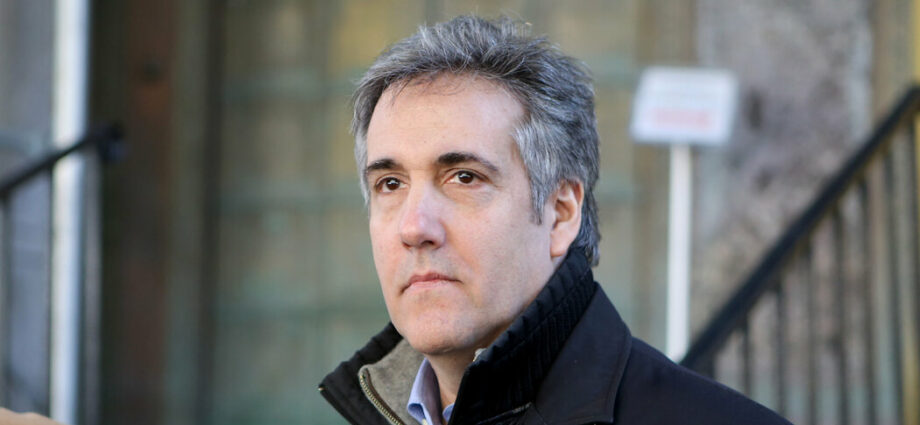Michael D. Cohen, a crucial witness in the Manhattan district attorney’s criminal investigation into former President Donald J. Trump, is meeting with prosecutors on Monday ahead of his expected appearance before the grand jury hearing evidence in the potential case.
Mr. Cohen, Mr. Trump’s former fixer, was seen entering the building in Lower Manhattan where the prosecutors work and the grand jury meets. Mr. Cohen is expected to testify later in the day.
On his way in, Mr. Cohen remarked to reporters that he felt “fine” but “a little twisted, to be honest, inside” and that his goal was “to tell the truth.” His lawyer, Lanny J. Davis, said “we have the facts, proven and documented, on our side.”
His appearance is one of several recent signals that the district attorney, Alvin L. Bragg, is poised to seek an indictment of the former president for his role in paying hush money to a porn star in the days before the 2016 presidential election.
Mr. Bragg’s prosecutors have already questioned at least seven other people before the grand jury this year, and Mr. Cohen is likely one of the final witnesses, according to people with knowledge of the matter. It would be rare for a prosecutor in a high-profile white-collar case to question nearly every relevant witness without intending to seek an indictment.
Another signal that an indictment is likely came when Mr. Bragg’s office informed Mr. Trump’s lawyers that the former president could appear before the grand jury this week should he want to do so. Such offers almost always indicate an indictment is close, because in New York, potential defendants have the right to answer questions in the grand jury shortly before they are indicted.
Mr. Trump declined the offer, people with knowledge of his decision said. And members of his legal team recently met privately with prosecutors to make their case against an indictment, one of his lawyers, Joseph Tacopina, said on “Good Morning America” on Monday. One of the lawyers at the meeting was Susan R. Necheles, who Mr. Tacopina said was “leading the charge” for Mr. Trump.
The former president has blasted Mr. Bragg’s investigation, saying that the Democratic district attorney is conducting a politically motivated “witch hunt.” Last week, Mr. Trump issued a statement in which he denied having an affair with Ms. Daniels and said Mr. Bragg’s inquiry was an effort to “take down” the leading Republican candidate in the 2024 presidential election.
If Mr. Bragg ultimately decides to ask the grand jurors to vote to indict Mr. Trump, the case could hinge on Mr. Cohen’s testimony.
It was Mr. Cohen who made the $130,000 hush money payment to Ms. Daniels in late October 2016, stifling her story of an affair with Mr. Trump. Mr. Trump later reimbursed him, signing monthly checks while he was president, and Mr. Cohen pleaded guilty in 2018 to federal charges involving the hush money.
How Times reporters cover politics. We rely on our journalists to be independent observers. So while Times staff members may vote, they are not allowed to endorse or campaign for candidates or political causes. This includes participating in marches or rallies in support of a movement or giving money to, or raising money for, any political candidate or election cause.
Mr. Bragg’s case would likely center on how Mr. Trump and his family business, the Trump Organization, handled the reimbursement payments to Mr. Cohen.
The company falsely recorded the payments in internal records as legal expenses, according to court papers in Mr. Cohen’s federal case. The Trump Organization’s records also cited a phony retainer agreement with Mr. Cohen, who was a lawyer but had no such agreement with the Trumps.
In New York, it can be a crime to falsify business records, but to make it a felony, prosecutors would need show that Mr. Trump’s “intent to defraud” included an effort to commit or conceal a second crime.
While it is unclear what that second crime might be in this case, it is possible that Mr. Bragg will cite a violation of state election law. Like the federal prosecutors who charged Mr. Cohen, Mr. Bragg’s prosecutors could argue that the payment to Ms. Daniels was an illicit contribution to Mr. Trump’s campaign, given that the money silenced the porn star, which helped his candidacy.
A conviction is not a sure thing. An attempt to combine the false records charge with the election violation would be based on a legal theory that has not been evaluated by judges, raising the possibility that a court could throw out or limit the charges. But if a case does go to trial, the circumstances of the hush money payment — a president essentially paying off a porn star — could appeal to a jury.
At trial, Mr. Trump’s lawyers are likely to attack Mr. Cohen’s credibility, noting that he pleaded guilty not only to the hush money but also to accusations that he lied to Congress about a potential Trump hotel deal in Moscow.
Prosecutors could respond that Mr. Cohen was lying for Mr. Trump, and that in recent years his story about the hush money has been consistent. Mr. Cohen, for example, has long said that Mr. Trump directed him to pay Ms. Daniels, an accusation that was supported by federal prosecutors in the case against Mr. Cohen.
And when Mr. Cohen was asked during congressional testimony why Mr. Trump’s company spread out the reimbursements over many months, he explained, “That was in order to hide what the payment was,” adding that it was done “so that it would look like a retainer.”
Asked whether Mr. Trump knew, Mr. Cohen replied, “Oh, he knew about everything, yes.” On Monday, Mr. Cohen said he was not testifying to exact “revenge” on Mr. Trump.
“This is all about accountability,” he said. “He needs to be held accountable for his dirty deeds.”
Sean Piccoli contributed reporting.
Source: Read Full Article

